'Q' who?
Netflix scores with 'Dept. Q,' plus 'The Better Sister,' 'Adults,' 'The Mountainhead,' 'The Rehearsal' finale, and more
This week’s What’s Alan Watching? newsletter coming up just as soon as we're here to discuss my friendship bracelet...
Slow coppers
It’s a good week for new shows I enjoyed, perhaps none more than Dept. Q, Scott Frank’s Netflix adaptation of the popular Danish noir books about a cold case unit (relocated to Scotland for the series) made up of misfit cops, starring Matthew Goode as the team’s misanthropic leader. As I say in my review, it is basically Slow Horses: PD — a bit less funny, a bit more emotional, but very much in the same territory of discarded people continually proving their worth. It’s a more straightforward show than Frank’s previous two Netflix projects, Godless and The Queen’s Gambit, but very well told. The first season’s story arguably doesn’t need nine episodes, but the added time spent with these characters makes the emotional payoffs at the end land harder than if Frank and company were just zipping through the plot. Strongly recommend.
Adults humor
Another new show I highly recommend: Adults, an early entry in the Gen Z hangout comedy subgenre, written by, and about, twentysomethings. All eight episodes (including two I haven’t gotten a chance to watch yet) are now streaming on Hulu, while FX is releasing them weekly, in a kind of compromise release schedule that acknowledges the divide between how different generations might be consuming this show. The lo-fi premise has a young guy from Queens sharing his childhood home with four close friends while his parents are off traveling the world. It is raunchy, ridiculous, and on occasion mortifyingly uncomfortable. But when it wasn’t making me hide under my desk until specific scenes ended, I laughed an awful lot.
Sister act 2: back in the Milch habit
A week after Netflix gave us Sirens, which I didn’t enjoy, Amazon has The Better Sister, which is also about a pair of sisters, with a similar dynamic to the pair in Sirens. One of them (played by Elizabeth Banks) is a hot mess, the other (played by Jessica Biel) a polished member of high society. This one’s more overtly a mystery, when Biel’s husband — who is also Banks’ ex-husband and father of their son, whom he raised with Biel — is murdered. But I gravitated much more towards the interplay between Banks and Biel — who are really good, and often really funny, together — and the way the show deals with addiction and abuse and the ways two siblings can grow up in the same house and have completely different relationships with their parents. (At a certain point, I began viewing the plot as the price of admission for watching the two leads together.)
In a larger sense, what interested me most was that The Better Sister was created by Olivia Milch — the younger daughter of David Milch — also produced by Olivia’s sister Elizabeth, and co-showrun by Olivia and Regina Corrado, who apprenticed under David as a writer on Deadwood. For a Rolling Stone feature, I visited the set several times, and spoke at length with Biel, Banks, the Milches, and Corrado about the many ways the story of the show mirrors the story of growing up in David’s home.
As with any feature story, I accumulated more material than I could use, even for the longer online version. One of my favorite deleted bits: On the set, I was making small talk with Biel, and began telling her about the chaotic environment on the Deadwood set, where David would give actors new dialogue on the day of shooting, and expect them to be word-perfect and meter-perfect within hours of them getting those pages. As I told this story, Biel began to get this horrified look on her face, turned to Olivia, and admitted that she’s never been a word-perfect actor, and was now worried she'd been messing everything up. (Appropriately enough for a discussion of Deadwood, she did not say “messing.”) Olivia assured her that she cares much more about the meter, and that Biel was nailing that. “Excuse me, I have to go have a panic attack,” Biel said before exiting.
Bro! Bro! Bro!
Not a series, but also of note this weekend is the debut of HBO’s Mountainhead, a movie that Succession creator Jesse Armstrong began writing in November, directed in March, and is now releasing it on an accelerated schedule. The tale of four tech bros gathering for a weekend while one of their companies has begun to inadvertently destabilize half the planet, it raises a classic question of how soon is too soon to satirize something resembling current events. I liked it a lot, while also finding it awfully bleak, and at times tough to sit through. I interviewed Armstrong about what he’s learned about the tech world since the Succession days, how he felt when real-world events began to resemble the movie he was making, and why he doesn’t think this is a unique moment for satire.
This is your captain speaking
When I watched the finale of The Rehearsal Season Two, I was gripped with two competing thoughts. On the one hand, my jaw was on the floor that Nathan Fielder had taken the last few years to learn how to fly a commercial airliner, and that he was actually doing it, with 150 passengers on board, without incident. On the other hand, it felt like the stunt was a bit beside the point of the story the season had been telling. It felt more like Fielder doing it just to show that he could, like when David Blaine’s specials started to be less about magic than him performing wild feats of endurance.
The communications issue that “Nathan” was so concerned about barely came up during the flight. There’s a brief moment where he’s worried that his copilot isn’t talking to him, but it doesn’t cause any problems, and mostly we’re just watching him smoothly pilot the aircraft. Yes, it’s a payoff to a degree about “Nathan” worrying that he has autism, and what that tells him about his difficulty interacting with other people. But that idea was itself introduced very late in the season.
Mostly, though, it’s just not what I personally come to The Rehearsal for. As I’ve said, the part that appeals to me is when Fielder tries to comedically kill a fly with a nuclear warhead, wasting lots of HBO money on an overly convoluted solution to a small problem, where the scale of it is hilarious in and of itself. Him learning to fly a big plane, and actually purchasing one, is a big big stunt, but it’s not a funny one. And because the lines are so deliberately blurry about what’s real and what isn’t about the guy Fielder plays on TV, I’m never emotionally invested in what he’s doing.
I’ve seen plenty of raves for the finale. If nothing else, I didn’t hate it like I did the end of the first season.
And Just Like That… I stopped watching
I stuck with the first two seasons of And Just Like That… out of a combination of affection for Sex and the City, fascination with the many ways the new show was fumbling its return to the world of Carrie Bradshaw and friends, and sheer masochism. Having watched this week’s premiere of Season Three, I think I’m done. Life’s too short for a hate-watch, but a few parting thoughts before I go.
First, it’s amusing that Michael Patrick King made such a big deal of diversifying the cast in terms of race, sexuality, and gender, and now two of those four new “leads” are gone, leaving only Seema (who’s at least fun as a Samantha type) and Lisa (who’s basically on another show). The series has cared so little about the newbies, other than as extensions of the three returning women, that it’s not a huge loss. But still. A fourth season’s already been ordered, and I wouldn’t be shocked if by that point, the poster just has Sarah Jessica Parker and Kristin Davis on it.
Second, the season premiere has a scene where Carrie and Aidan attempt to have phone sex, and it’s always startling whenever this show (or Sex and the City before it) puts its heroine — who is a celebrated sex columnist — into stories about sex, given how rare they’ve been since maybe at least midway through the original series, if not earlier.
And third, the minute I saw Parker in the hat pictured above, all I could think was, “Carrie Bradshaw IS Turd Ferguson!”
She is not yet dead!
Hacks Season Four hit its creative peak with last week’s episode, where Deborah gave up the talk show she’s dreamed of having for her entire career because she wasn’t willing to sacrifice Ava to keep it. This week’s finale was more of an epilogue, with Deborah trying to figure out how to keep performing despite the rigid non-compete clause in her contract. But what’s notable — and pleasantly surprising — to me is that this is the first Hacks season to not conclude with the two leads separating or otherwise being at odds. Ava’s not thrilled to be on an indefinite stay in Asia, but before she can leave, the Internet mistakenly reports that Deborah has died, and the very much alive Deborah decides she can use this to help resurrect her career. We’ll see how that plays out in the fifth season, which was just announced, but I’m looking forward to that much more than another pointless cycle of them being mad at each other for several episodes before they remember that they’re best friends.
The Last shift
I already vented my frustration with The Last of Us Season Two finale — which in no way felt like a finale — with Sunday night’s recap, and many of you were similarly annoyed in our weekly chat.
One follow-up I want to make is about the big defense of the finale, and the season, that I’ve heard from gamers: that it’s not fair to judge this season without having seen the whole story from the second game play out, and that there’s a point to all of this. To that, I’ll say a couple of things. One is that in the game, the POV shift happens, and you can immediately keep going to see what comes next. The TV show is going to be gone for at least a year, and more likely two years. So leaving us at this point, and right after that fake cliffhanger with the gunshot, plays very differently than it must have in the game.
Also, the needs of one medium are not the same as another. Just because a story works in a game, a book, a podcast, or however the source material was presented, doesn’t mean the exact same approach will work for a TV show. If you can’t fully appreciate this show without having played the game, then Mazin and Druckmann aren’t doing their jobs properly, in the same way that Benioff and Weiss did in those moments when a Game of Thrones story was impenetrable to non-readers.
Is it possible that Season Three, whenever it comes, will retroactively make me appreciate this revenge plot, and the decision to kill Joel? Absolutely. But I can only judge what I’ve seen so far, and a lot of that ranged from disappointing to outright annoying. And now there’s a long wait until the show continues.
Poker Face recaplet: “Sloppy Joseph”
Finally, “Sloppy Joseph” is my favorite Poker Face of Season Two so far. It’s another clever spin on the basic premise, this time with the murder victim being an elementary classroom pet with the incredible name “Joseph Gerbils.” Charlie isn’t trying to get anyone arrested; she just wants to free sweet scholarship student Elijah from blaming himself for Joseph’s death, and to convince his classmate Stephanie to stop blackmailing and manipulating everyone in that school. Charlie versus an evil child is a really fun dynamic, all the way up to the final scene where Stephanie stands stock still and stares at Charlie, like she’s a ghost from a horror movie.
In terms of adult guest stars, this one gets more value out of its Slums of Beverly Hills reunion with Lyonne and David Krumholtz than “Last Looks” did with her and Kevin Corrigan. The episode’s a double reunion, since Lyonne also shares several scenes with Adrienne Moore from Orange Is the New Black. And to prove that the show doesn’t just fill out each week’s cast with people its star has worked with before, we also get Character Actress Margo Martindale as the school’s principal, who seems awful at first until we discover that Stephanie is blackmailing her into doing her bidding.
There’s a basic formula to Poker Face, but I appreciate that Season Two is working so hard to stick to the spirit of that formula while trying to be unpredictable with how it works each week.
That’s it for this week! What did everybody else think?


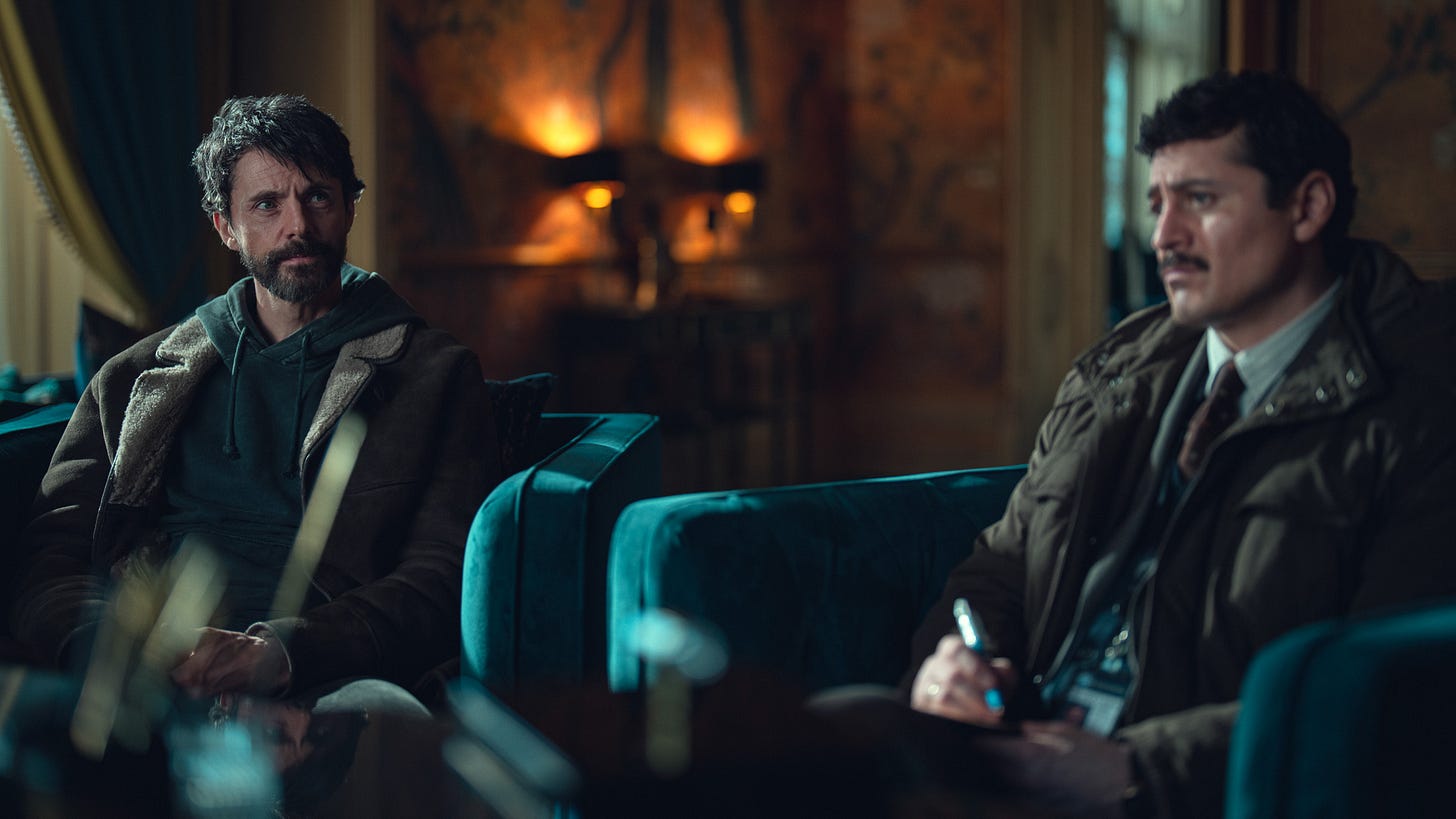
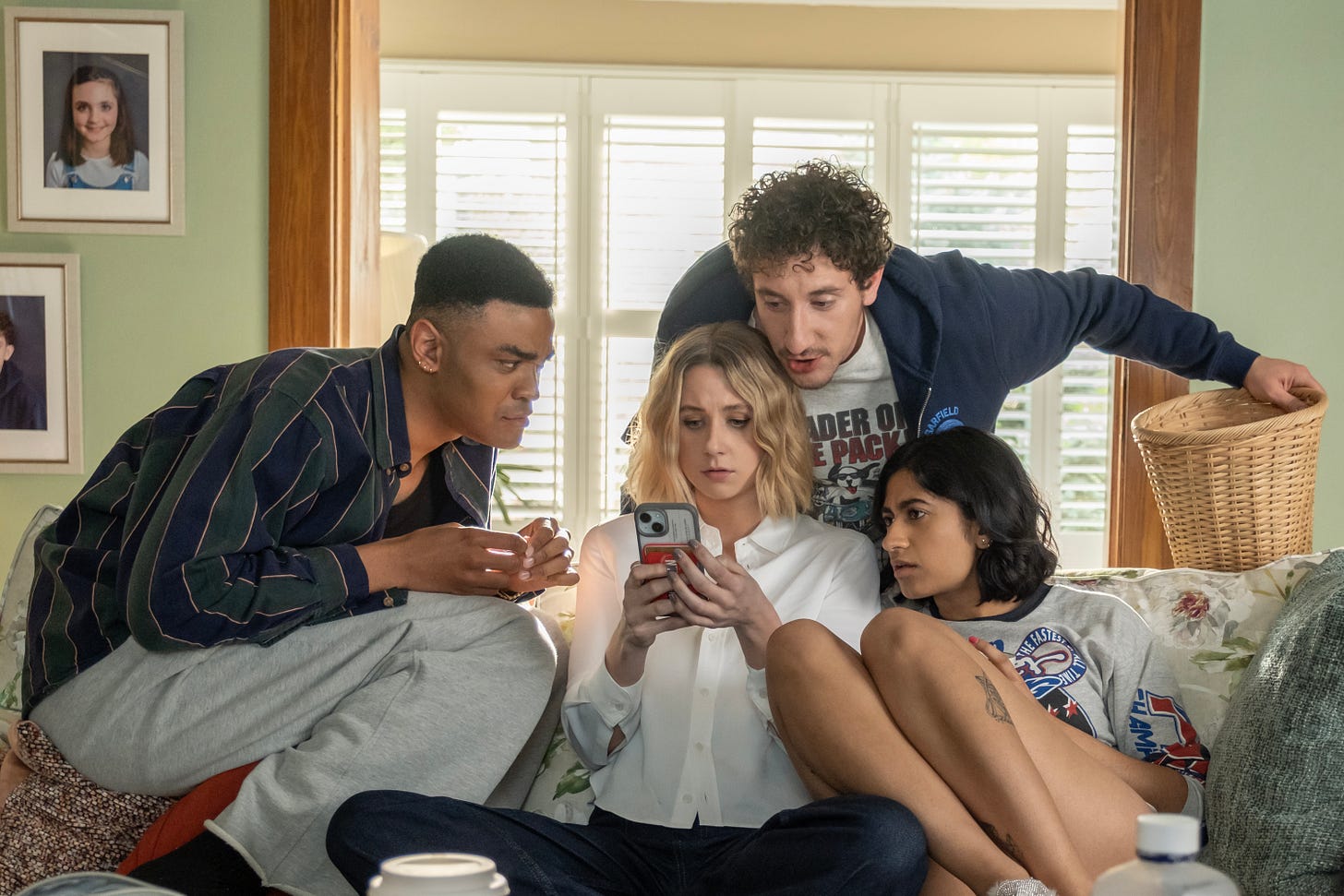
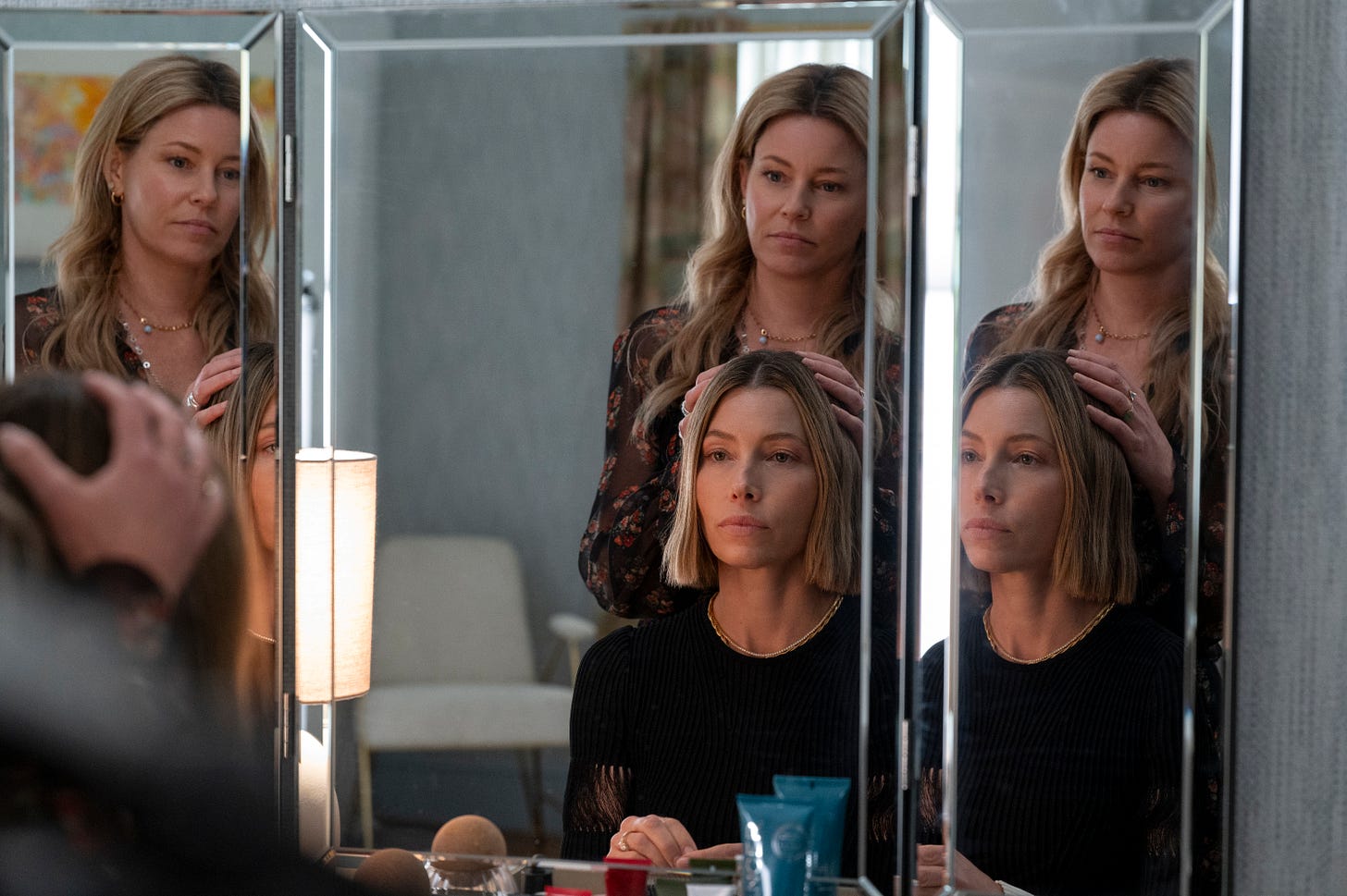
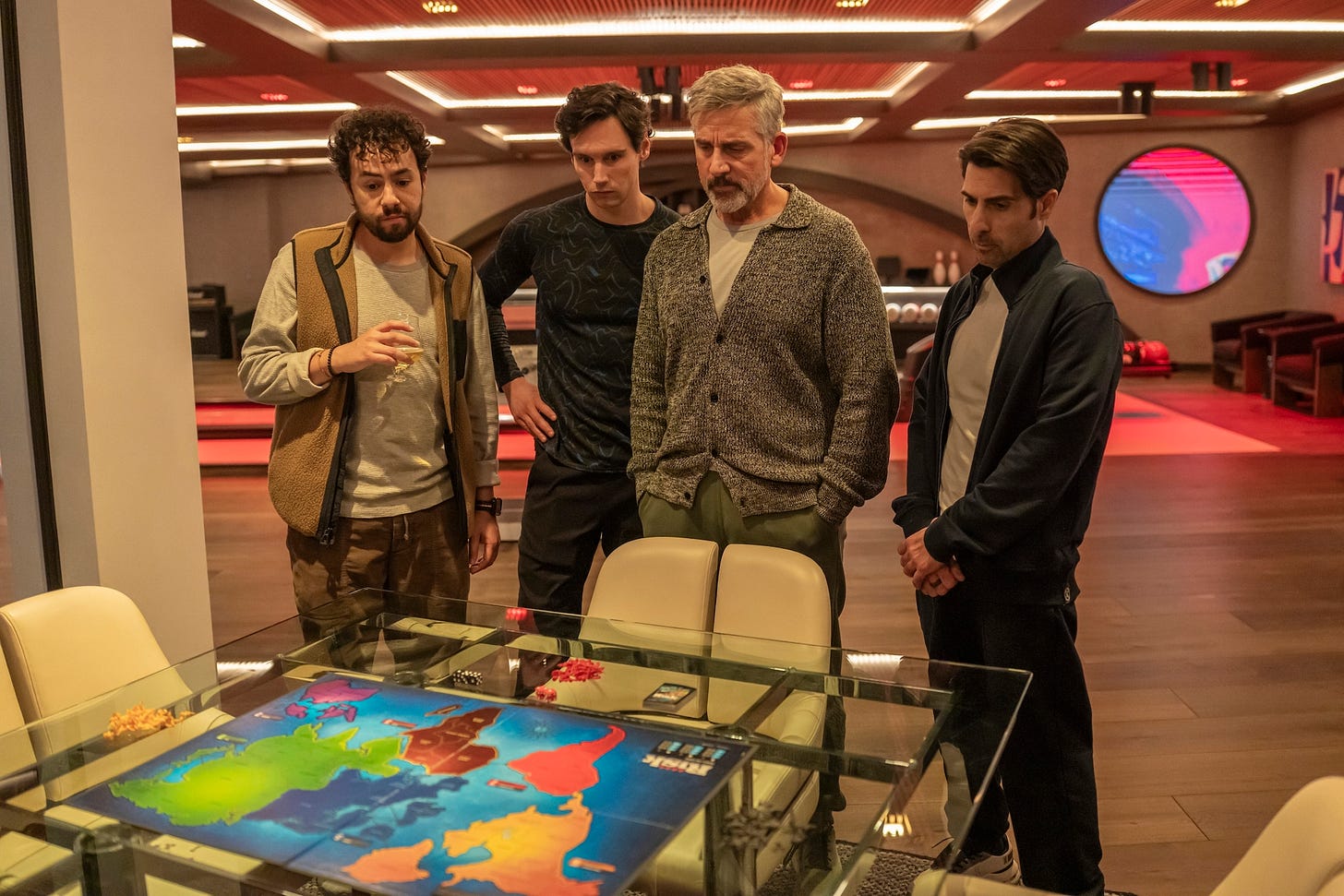


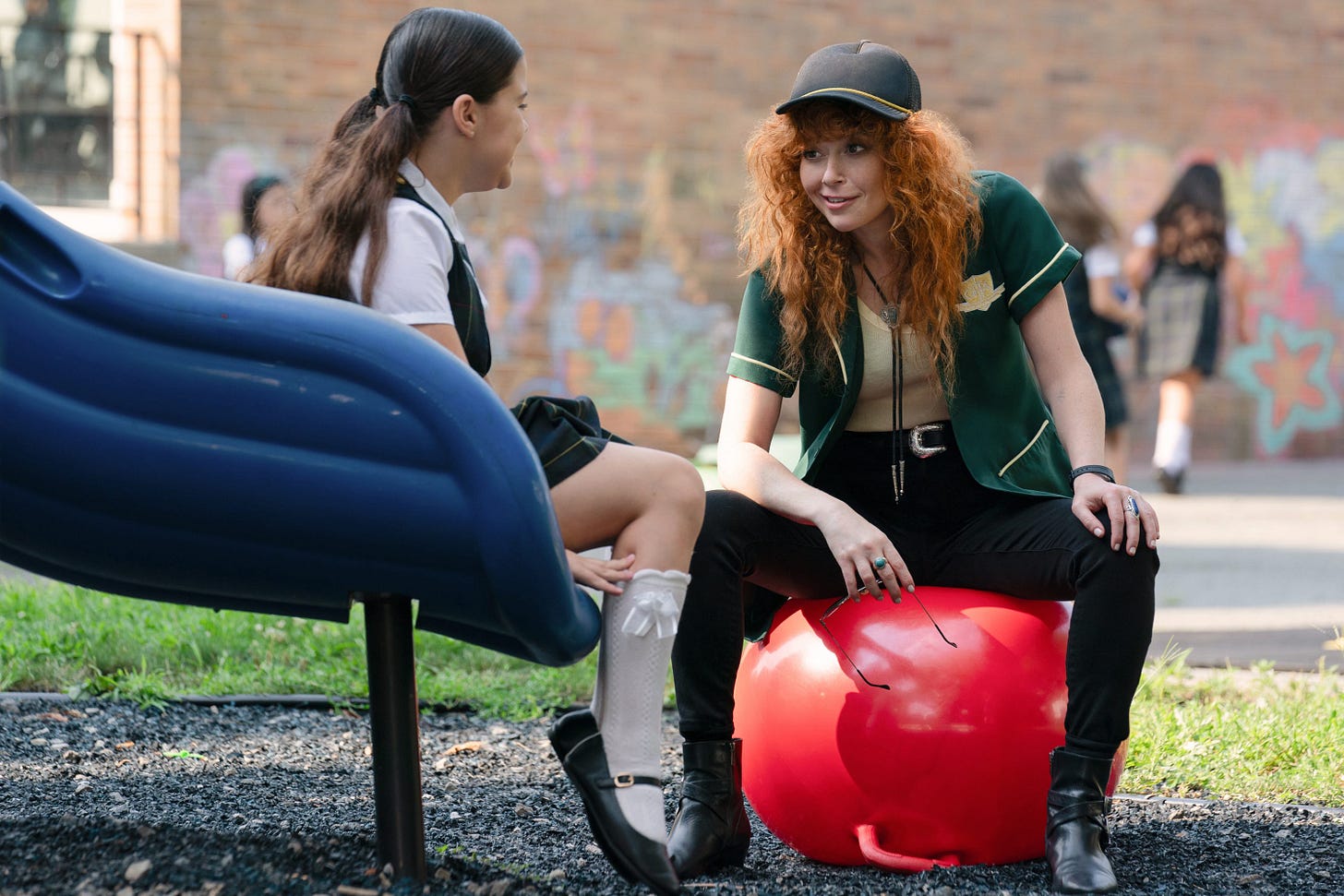
To your point, if TLOUp2 ended at that moment and you had to wait years for the next game, gamers would have had the same exact reaction. A season of television has to be satisfying in its own right, and this season of TLOU just wasn't.
In Dept Q the big house that ultimately gets trashed was built by my parents, converting a WW2 radar station in the early 2000s. Got on the phone to them immediately as the kids jaws hit the floor (they sold up in 2018 and moved to a nearby village) and the underwhelming reply I got was "oh, we don’t have Netflix, but we read about it in the local paper last year".